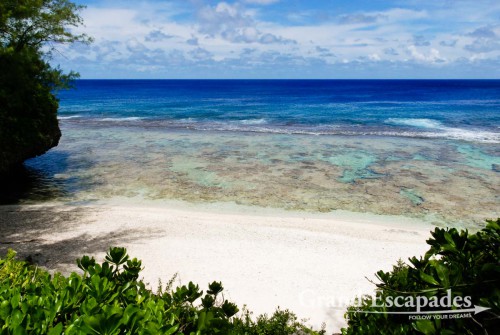
Beach where Captain Cook landed for the first time in the Cook Islands, in 1777, Atiu Island, Cook Islands
One morning we spent with Papa Paiere, a retired history teacher and local of Atiu who worked in Rarotonga for many years. After retiring, he returned to Atiu and is now sharing his knowledge with the very few tourists. And this is what we learned…
The first people arrived in Atiu about 700 years ago and settled down near the swamp and the lake where they found water to plant taro. Oh yes, Captain Cook also anchored here in 1777, but as Papa Paiere stressed, did not come on land: he only sent some people ashore with a Tahitian translator to get food for the crew and the animals on board.
The first missionaries arrived around 1820 and made the population move to the center of the island. Why? We can only guess, to facilitate and control church attendance. They established three zones for the 2.000 inhabitants, who were divided into 20 different tribes. These sectors can still be identified today as well as the adherence to certain families. To this day three are Arikis, as the ancient rulers were called in Atiu, who are influential in various affairs. To underline their status nowadays, they still have their own seating area in church for example. Only in the early 20th century was the land surveyed and what used to be common tribal land was assigned to the respective family living on a certain lot.
Since colonial times, different cash crops were introduced in Atiu: coffee, oranges, pineapples, vanilla… Except coffee, none has survived since transport is simply too expensive.
After this extensive trip through hundreds of years of history, we were invited to Papa Paiere’s home where we sampled breadfruit, mango, his own homegrown coffee and coconut juice. Papa Paiere also rents out a few superb, spacious, self-contained bungalows with a porch. We truly loved to listen to his stories and childhood memories, when the only contact with the outer world was the random arrival of a cargo boat.
During this tour we also visited one of the five churches on the island and thus decided to attend mass on Sunday. An unforgettable experience, we did not understand a word of the preaching, all in Maori, but the singing brought you close to tears. Especially the women were dressed to the nine, with elegant attires and amazing hats, most men arrived in a suit, some of those wearing flip flops however.

In February 2012, I was allowed to spend a whole day with Papa Paiere.
He received me at his home, his wife had prepared a delicious fresh meal.
Talking about life on the island and the people who live there.
Visited special places and heard stories.
Great and special man